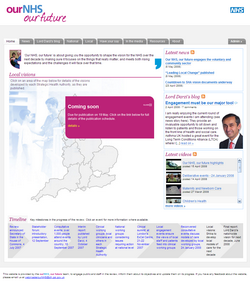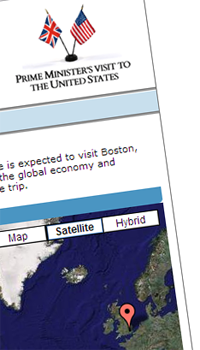From the ‘you can’t win’ department… Guido today picks up on a piece by Shane Greer last week, claiming that ‘Brown uses Downing Street (web)site to promote Labour’. And what incendiary partisan material are we talking about, precisely? An external hyperlink.
The No10 site has a page of Gordon Brown’s speeches. Or strictly, as it states in the page’s first line, non-political speeches. If you heard that Gordon Brown had made a speech, it’s the logical first place to look. But what if the speech had been made in a party-political capacity? It would be wrong for No10 to carry that speech on their website. And nobody’s suggesting otherwise.
So what do you do – present people with a dead end, or try and be helpful? It’s not as if they don’t (or rather, didn’t) make clear that you’re crossing the line from government to politics. As Shane’s screengrab shows, the link stated: ‘political speeches at the Labour Party website’. And in keeping with the site’s approach to external links, it opened in a new window. Hey, there’s even a page explaining why they have to be selective about the material they carry, with links to both the Ministerial and Civil Service Codes.
Shane asks: ‘What exactly is the justification for using taxpayer (sic) money to drive traffic to the Labour Party website?’ Well, there are two.
-
Good customer service. If you walk into a shop to buy something, and they’re out of stock, you expect the salesperson to suggest somewhere else you might try. It costs them a sale, but they do it because of plain common decency.
-
More efficient use of taxpayers’ money. If you don’t tell people where else to look, they will contact you to ask. They will call the press office, or send emails. It’s much more time-consuming, and hence much more expensive, for a civil servant to have to respond personally to those calls and emails.
The link has now gone. Party politics 1, common sense 0.
But let’s not pretend this is a Labour thing. I worked in government comms as far back as 1995. People would call up, asking for speeches by Conservative ministers – notably during the party conferences, but not exclusively. We either produced a transcript scrubbed clean of party-political material; or we gave them the number for Conservative Central Office. It was the right thing to do. Were we using taxpayers’ money to help promote the Tory Party? By Shane’s argument, yes. Sorry.
Disclosure: Although I’m doing some work for/with the No10 web guys, I don’t have any inside knowledge of this matter. I haven’t spoken to them about it, and was not involved in this decision in any respect.
Disclaimer: Although I’m linking to their websites in the text above, I do not endorse the views expressed by Shane Greer or Guido Fawkes. My company, Puffbox Ltd, is not using its proceeds or resources to promote either Mr Greer or Mr Staines. Just so we’re clear.
 One of my favourite projects over the last year has been Our NHS, Our Future – the website for Lord Darzi’s review of the NHS. With the review entering its final stages, we’ve taken the opportunity to give the site a lick of paint, and reworked the homepage.
One of my favourite projects over the last year has been Our NHS, Our Future – the website for Lord Darzi’s review of the NHS. With the review entering its final stages, we’ve taken the opportunity to give the site a lick of paint, and reworked the homepage.

 I hinted that there might be more online initiatives coming out of
I hinted that there might be more online initiatives coming out of